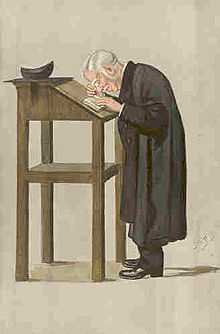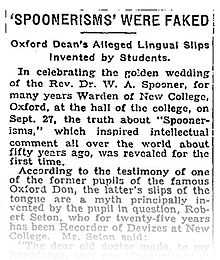William Archibald Spooner

William Archibald Spooner (22 July 1844 – 29 August 1930) was a famous Oxford don whose name is given to the linguistic phenomenon of spoonerism.
Life and career
Spooner was born at 17 Chapel Street, Grosvenor Place, London, SW1. He was educated at Oswestry School (where he was a contemporary of Frederick Gustavus Burnaby) and New College, Oxford, where he was the first non-Wykehamist to become an undergraduate. He was ordained deacon in the Church of England in 1872 and priest in 1875. He had five children: William Wycliffe, Frances Catherine, Rosemary, Ellen Maxwell, and Agnes Mary.
Spooner remained at New College for more than sixty years, serving as fellow (1867), lecturer (1868), tutor (1869), dean (1876–1889) and warden (1903–1924). He lectured on ancient history, divinity and philosophy (especially on Aristotle's ethics).
Spooner was well liked and respected, described as "an albino, small, with a pink face, poor eyesight, and a head too large for his body". It was said that "his reputation was that of a genial, kindly, hospitable man."[1]
In the opinion of Roy Harrod, Spooner exceeded all the heads of Oxford and Cambridge colleges he had known "having regard to his scholarship, devotion to duty, and wisdom."[2]
Spooner was buried in the cemetery at Grasmere in Cumbria.[3]
Spoonerisms

Spooner has become famous for his (real or alleged) "spoonerisms", plays on words in which corresponding consonants, vowels, or morphemes are switched. Few, if any, of his own spoonerisms were deliberate, and many of those attributed to him are apocryphal.
The Oxford Dictionary of Quotations (3rd edition, 1979) lists only one substantiated Spoonerism: "The weight of rages will press hard upon the employer." Spooner himself admitted to uttering "Kinkering Congs Their Titles Take" in a 1930 interview.[4] Spooner is said to have disliked the reputation gained for getting his words muddled.
After the concept of spoonerisms became popularized, Spooner denounced a crowd that had gathered to hear him speak by saying, "You haven't come for my lecture, you just want to hear one of those...things."
Spooner is supposed to have committed other absent-minded gaffes. He was said to have invited a don to tea, "to welcome Stanley Casson, our new archaeology Fellow". "But, sir," the man replied, "I am Stanley Casson". "Never mind," Spooner said, "Come all the same."[1]
At a party in North Oxfordshire, his wife sustained a cut on her finger. When concerned friends asked him "Did she lose her finger permanently?", he is supposed to have answered "She lost her finger permanently, for a time."
One recorded incident had Spooner write a note asking for a fellow lecturer at New College to see him immediately about a matter. The note had a postscript informing the lecturer that the matter had been resolved and he no longer needed to see him.
Another story tells of Spooner preaching a sermon about St. Paul, but substituted the name Aristotle for St. Paul. When he finished, he came down from the pulpit, paused, went back up, and told his bewildered congregation: "Did I say Aristotle? I meant St. Paul." Some versions of this story have Spooner substituting Aristotle for Aquinas.
It is said that Spooner not only mixed up words but entire concepts on occasion. Reportedly, he once spilled salt at a dinner and absentmindedly poured some wine on it, a reversal of the usual procedure. According to sources, he once remarked of a widow that "her husband was eaten by missionaries".
Spooner was once found by an undergraduate attempting to inflate a flat tyre on his bicycle. However, he was attempting to inflate the inflated tyre and not the flat one. Taxed, he apparently exclaimed: "Do they not communicate?"
His attitude towards his unintentional fame softened in his final years, even granting the occasional reprint for humour's sake, regardless of validity.
On his death, The Times recorded that "He was not afraid of conversation."[5]
Select spoonerisms
Some of the more famous quotations attributed to Spooner (and possibly Spooner's students) include:
- "The Lord is a shoving leopard", or "Come into the arms of the shoving leopard" (Loving shepherd)
- "It is kisstomary to cuss the bride" (...customary to kiss the bride)
- "Mardon me padam, this pie is occupewed. Can I sew you to another sheet?" (Pardon me, madam, this pew is occupied. Can I show you to another seat?)
- "You have hissed all my mystery lectures, and were caught fighting a liar in the quad. Having tasted two worms, you will leave by the next town drain" (You have missed all my history lectures, and were caught lighting a fire in the quad. Having wasted two terms, you will leave by the next down train)
- He supposedly remarked to one lady, during a college reception, "You'll soon be had as a matter of course" (You'll soon be mad as a Hatter of course)
- "Let us glaze our rasses to the queer old Dean" (...raise our glasses to the dear old queen. Note: Alternatively, "Let us glaze our arses"; presumably to be a spoonerism the letter r is placed at the beginning of "arses" but when spoken the r's in "our" and "rasses" are nearly indistinguishable, thus producing the alternative, more humorous "glaze our arses.")
- "We'll have the hags flung out" (...flags hung out)
- "a half-warmed fish" (A half-formed wish)
- "Is the bean dizzy?" (Is the Dean busy?)
- "Go and shake a tower" (Go and take a shower)
- "a well-boiled icicle" (A well-oiled bicycle)
- "I've lost my signifying glass". (Later): "Oh, well, it doesn't magnify."
- "This vast display of cattleships and bruisers". (This vast display of battleships and cruisers)
- "Such Bulgarians should be vanished...". (Such vulgarians should be banished)
- "He was killed by a blushing crow". (He was killed by a crushing blow)
- "The sale of two titties". (The tale of two cities)
See also
Sources
- The Oxford Dictionary of National Biography (includes photo)[broken link]
- Obituary in the Manchester Guardian on 1 September 1930
References
- ↑ 1.0 1.1 Reader's Digest (February 1995)
- ↑ Hayter, W. (1977). Spooner: A biography. London: W.H. Allen. (See page 135)
- ↑ "William Archbald Spooner (1844–1930) – Find a Grave Memorial". findagrave.com. Retrieved 14 June 2013.
- ↑ Fun-With-Words History
- ↑ J.A.Gere and John Sparrow (ed.), Geoffrey Madan's Notebooks, Oxford University Press, 1981
External links
- Who was Dr. Spooner of "spoonerism" fame? (from The Straight Dope website)
- The 'Brief History of The College' states that Dr. Spooner 'almost certainly never uttered a 'spoonerism,' but equally certainly had a number of curious verbal traits'. (From the website of New College, where Dr. Spooner was a fellow.)
|